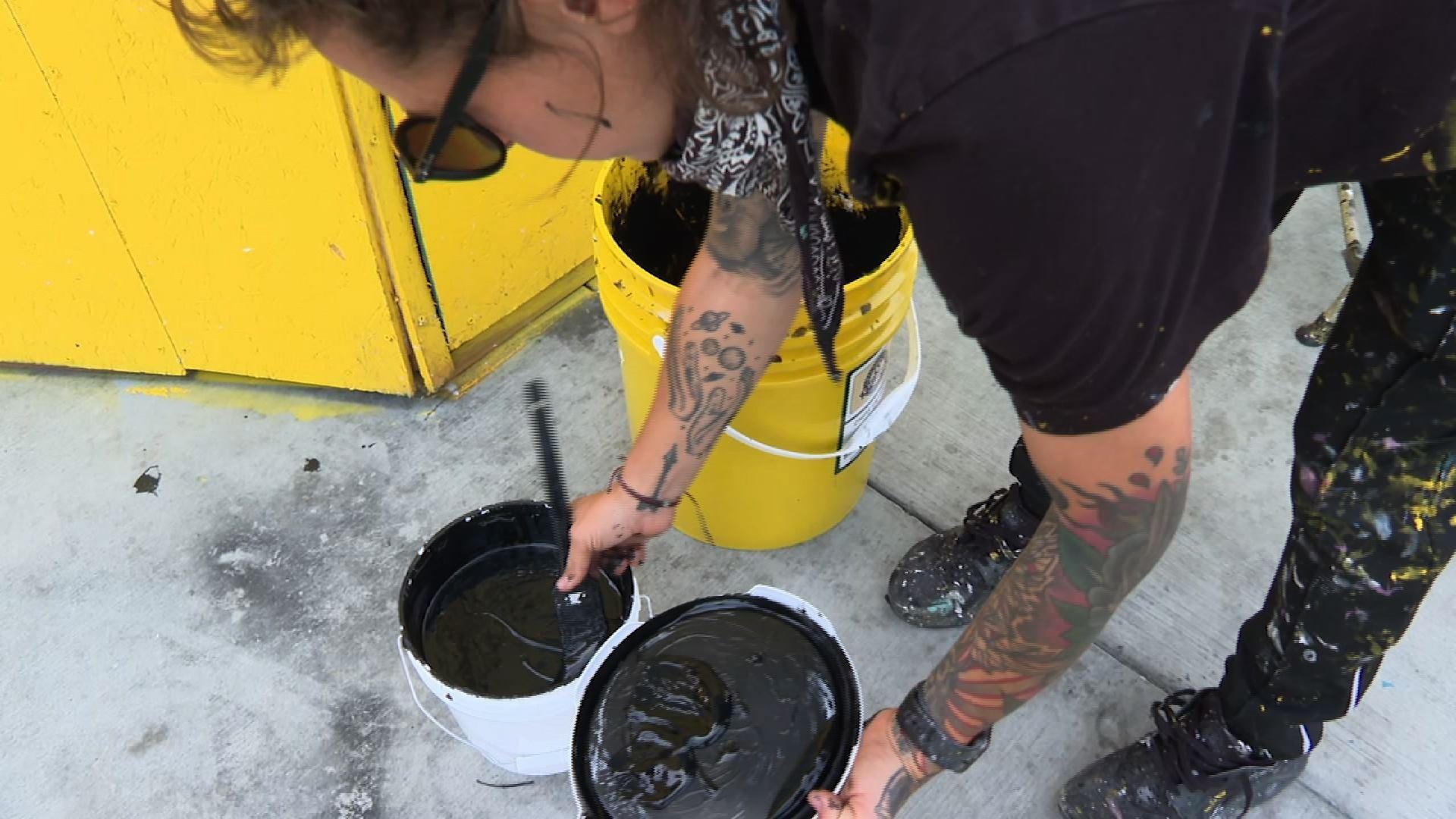
Sensing the worst, two weeks before Russia began invading his homeland, tech entrepreneur Volodymir “Vlad” Panchenko wanted to charter a plane for a month to get as many of his employees and their families out of Kyiv, Ukraine, as quickly as possible
But the co-founder of video game and metaverse marketplace DMarket said his board was giving him heavy pushback because his plan to shuttle workers to the Balkan country of Montenegro would lead to a 20% budget increase. But in a rare show of defiance, Panchenko trusted his gut and told them he was executing his contingency plan anyway – regardless of the cost.
“They said I was overreacting,” said Panchenko, who started making plans in January. “I told them that I felt a war was coming and we should leave. And if there isn’t, we’ll spend time in a warm place and still get our work done.”
INTENSE ATTACKS:Ukraine satellite images show extensive damage from Russian attacks
RALLYING NATO: Biden tells NATO allies in Brussels to ‘stay unified’ as he backs booting Russia from G-20
Russia invaded Ukraine on Feb. 24. DMarket and many other tech companies rely on colleagues who live and work in Ukraine, a fast-growing tech hotbed. While known companies such as Google and Microsoft have workers based in Ukraine, many far lesser-known, early- and mid-stage startups globally count on the embattled country’s talent-rich pool of engineers and developers and could be in jeopardy due to the conflict.
For DMarket, Panchenko’s plan worked. A majority of his employees, their spouses, their kids, their parents, even pets – about 140 in total – are spending the next three months living in apartments in Montenegro as Panchenko works to figure out where his company may relocate as the month-long war intensifies.
“I’ll take that 20% budget hike instead of being in grave danger and possibly losing 100% of my company,” Panchenko said, choking up. “We are going to try to be one step ahead of this situation.”
Meanwhile, fellow tech entrepreneur and DMarket advisor Alexander Kokhanovskyy has traded in his 50- to 60-hour workweek typically programming or coding in a gaming chair for a rifle and a camo uniform. He’s patrolling with law enforcement officers in Kyiv trying to help keep his hometown and its surrounding areas as safe as possible.
“This is my full-time job at the moment,” Kokhanovskyy said after a late Friday shift, still in uniform. “Unfortunately, the first thing I need to do is to defend my country. This is the job we need to do.”
Ukraine, Eastern Europe is rich in tech skills
In the long run, the world needs Ukraine’s tech workers.
“There is an abundance of talent in Ukraine,” said Andrew Vasylyk, vice president of StartupSoft, a company he co-founded with his brother to help startups build developer teams remotely with Ukrainian-based tech workers.
Board member of the popular Ukraine-based app Readdle, Denys Zhadanov,estimates the number of tech professionals in Eastern Europe ranges between 100,000 and 200,000.
Zank Bennett relies on a team in Kyiv to help with his San Diego-based boutique data science consultancy company, whose clients include Nordstrom and medical device company Abbott Laboratories. Bennett said he began talking with his Ukrainian team about four months ago about the surge of Russian troops on Ukraine’s eastern border.
Now Bennett is scrambling to help them with any needs, including money, as the Kiyv office shut down on Feb. 3. He said many of them continue to work in remote places including Central Europe, Germany, Belgium and The Netherlands as “things are still rather fluid.”
Bennett said his clients are offering to help his employees as well, asking him if they need anything ranging from cash to shelter abroad. “This is so unchartered territory for us. There’s no playbook for this,” Bennett said.
CYBER ELVES:Ukraine’s volunteer online army: Meet the ‘cyber elves’ fighting Russian trolls on Facebook
FACT CHECK:Biden’s ‘new world order’ reference tied to Ukraine, not conspiracy theory
Demand for Ukrainian developers has been strong for about a decade, StartupSoft’s Vasylyk said. He believes it’s because of their rigorous education that includes taking STEM (science, technology, engineering and math) courses at an early age.
“Many Ukrainians have access to very good math and physics education. That creates a basis for an analytical mindset, which is a good foundation to become an engineer,” Readdle’s Zhadanov said. “Overall, we live in a very interconnected world. Some parts of the world tend to create great entrepreneurs, and Ukraine happens to have the foundation to produce great engineers.”
Surprising Ukrainian influence in daily life
Additionally, some skillful Ukrainian tech workers’ salaries are also about a third less than their U.S. counterparts, critical for young startups, said Roman Shaposhnik, co-founder & chief technology officer of Silicon Valley edge computing startup ZEDEDA. But Panchenko currently believes it’s “a seller’s market” and Ukrainian tech workers are asking for their market share when it comes to salary, and then some.
Unbeknownst to the masses, Lamine Zarrad, the founder & CEO of Austin, Texas-based fintech startup Stellar, believes that “Ukrainians have more of an influence on our everyday lives than we probably think.”
Ukrainian developers often create the backend software that ranges from how we bank online to productivity apps for iPhones and Macs, to streaming our favorite shows, movies, music and video games, experts say.
“It’s the hidden tech you can’t see but hits on many facets of our activities,” said Shaposhnik of ZEDEDA, who is a board member for the Apache Software Foundation, a nonprofit of open-source developers currently helping many Ukrainian (and even Russian startups) relocate to other countries including Cyprus, where he’s currently located.
“It’s among the friendliest and quickest locations to do this type of rebooting to give small startups a second lease on life,” Shaposhnik said about the startups’ relocation strategy. “They will still have their companies and they still are safe.”
Nearly 4 million Ukrainians have fled since the Russian invasion started, according to the United Nations. Much like their fellow citizens, Ukrainian tech workers have been working through bouts of danger since various Russian separatist movements had been pulling Ukraine apart for years.
Russia steps in amid chaos
Ukraine’s troubles began in late 2013 when former President Viktor Yanukovych suspended an agreement that would have brought the country closer to the European Union. The chaos created an opportunity for neighboring Russia, which annexed part of the country.
Two eastern regions of Ukraine had dissolved into civil war, with numerous conflicts prior to Russia’s current invasion. Tech companies such as RevJet were among those that relocated most of their Ukrainian workers to such places as Canada, neighboring countries including Poland, or other parts of Europe.
Perhaps the most well-known Ukraine tech company is Grammarly, creator of an artificial intelligence-based tool that helps its millions of users write better. The company, founded in Kyiv in 2009, and currently valued at $13 billion, has kept mum on its contingency plans due to safety. But in a recent blog on LinkedIn, CEO Brad Hoover said Ukraine holds “a special place” in his heart.
“While we hope for the best, we have also prepared for the worst,” Hoover said. “That includes having contingency plans for various scenarios, along with financial and logistical assistance to better support our team members and their families in getting to safety. It also includes business continuity plans to ensure Grammarly’s services will not be disrupted.”
Another Ukrainian tech company, AJAX Systems, has created an air raid siren app to alert citizens of incoming air raids sometimes faster than street sirens about possible bombings. The app has been downloaded on 4 million smartphones, the company told NBC News. AJAX systems have since moved its employees based in bomb-riddled Kharkiv, where more than 500 people reportedly have been killed, to offices in Lviv near the Poland border.
“From a global perspective, Ukraine has been seen as an underdog,” said Vasylyk, the StartupSoft executive. “The conflict is posing major logistical challenges, but we see they are ready to adapt to the changing external factors and their new realities.”
‘It’s really hard to plan for this war’
Sitting in front of a laptop screen in Berlin, Aleksandr Volodarsky shakes his head in disbelief several times. The head of Lemon.io, a Kyiv-based IT mid-stage startup that connects European web developers to American startups he founded in 2015, wishes he would’ve planned better.
Now as airstrikes, sirens and gunfire hit Ukraine, Volodarsky and his company are responding, albeit late in his view, to help his staff be safe as many insist they want to keep working through the war even if they have to do it from shelters and bunkers.
“Looking back, we were very naive, and if I could go back four weeks ago, I would relocate somewhere in Europe,” Volodarsky said. “We were kind of preparing, but we really didn’t know s—, didn’t know what war would actually look like. It’s really hard to plan for this war.”
Volodarsky has shared his thoughts and vulnerability publicly on Twitter, telling his followers that he gave his employees their salaries two months in advance, in cash, in case the banking system crashes. The company has given substantially to the Povernys Zhyvym (Come Back Alive) fund and Volodarsky said it also will give any profits “from February and onwards to the Ukrainian army and volunteers.”
There is very little you can do as a CEO when your country 🇺🇦 is on the edge of a full-scale war.
But at such times everyone has to play their role at best. We have 40 employees and 100s of Ukrainian developers in our network.
Right now it is my job to make their lives easier.
— Aleksandr Volodarsky 🇺🇦 (@volodarik) February 14, 2022
He’s helping to relocate any of his workers to want to go. Some have moved to parts of western Ukraine and others have stayed in and around Kyiv. He had to pause a marketing meeting on Monday as sirens were blasting, forcing some employees to seek shelter.
Filling in for a frontline front-line fighter
Volodarsky is filling in part-time for his chief marketing officer, Eugene Latta, who is on the front lines fighting with the Ukrainian Army in his hometown of Odessa. It’s nothing new for Latta, who reportedly already took part in a war in the east of Ukraine in 2014 and was wounded.
Volodarsky said he’s continuing to pay Latta his full salary as well.
“It’s important to keep working. At first, it was like screw the goals, we just need to be able to keep the company going,” Volodarsky said. “The economy has to keep performing, to pay taxes and support our Army.
But still, he continues “feeling remorseful and regret.” It’s “hard to feel comfort,” even though no staffers have been harmed so far. While his immediate family relocated to Israel, Volodarsky worries about his elderly mother-in-law and great aunt who wanted to stay in Ukraine.
He keeps saying “we could do much more,” to help others in his homeland. And he seems determined to do it.
“It’s just crazy to think that a month and a half ago you couldn’t have imagined that in this century, in 2022, there’s a full-scale war in Europe,” Volodarsky said. “It shows that it’s impossible to think you’re always safe. Two years ago we were crying about staying at home and not going to restaurants because of COVID. What a difference time makes.”
Shocked and stressed, but fighting on all fronts
The simple yet magnified post on Readdle executive Denys Zhadanov’s social media accounts sums up how he’s dealing with life these days: “War-balance.”
Meanwhile, employees at Kyiv-based Readdle, among the early successful sellers in Apple’s app store, had regular town-hall meetings to “prepare for the worst,” Zhadanov said. The company has nearly 200 million downloads for products like Spark email, PDF Expert, Calendars, Documents and Scanner Pro, was a runner-up for Apple’s App of the Year.
“We communicated information and guidance while preparing the logistics for the possible need to move team members and their families internally within Ukraine and to support team members who wished to move to work in other locations,” Zhadanov said. “As a result, we were able to respond quickly.”
And defiantly, Zhadanov believes. He said the Ukrainian tech community is united, “incredibly loyal” and will remain committed to defending its future, instead of retreating from the opposition.
“Our international tech business is very resilient, even in the face of war,” Zhadnov said. “Users worldwide still need our apps and the demand is strong.”
Tech has no borders, said Shaposhnik, who cites cybersecurity company Acronis’ decision to suspend its operations in Russia. It’s one of many companies that has taken similar stances due to the escalating conflict.
“With everything being super-connected, I believe Russia is soon going to have problems with its supply chain,” said Shaposhnik, who added that because of Ukraine’s ban on men between the ages of 18 to 60 leaving the country, many programmers are doing double duty as soldiers.
“A lot of them wouldn’t leave anyway, even if they had the chance,” Shaposhnik said. “They are basically willing to give their lives for their country.”
Similar to many of the Ukrainian-based tech companies, DMarket’s Panchenko said his company is helping to supply the Ukrainian Army with everything from vests, helmets, thermal vision goggles to see in the dark, and medical supplies.
“Yes, there is a price I’m paying for, but I think, unfortunately, the situation could get even worse,” Panchenko said. “We have to stop the aggression.”
Panchenko knows firsthand as DMarket’s head of payments Oleksiy Gnatenko is fighting on the frontlines with the army in uniform and armed.
Gnatenko was scheduled to talk with USA TODAY about his experience, but DMarket human resources head Svetlana Iashchenko, whose husband is volunteering with the army said that Gnatenko’s “situation for today has dramatically changed,” because of the war.
Iashchenko chose not to go to Montenegro and stay in Kyiv with her husband, Alex, a software engineer at another startup, who spends his evenings going out on patrol with armed men trying to protect the area. They will celebrate their 16th wedding anniversary in June.
“Hoping to make it,” said Iashchenko, wiping tears during a late-night video call on Wednesday. She said that working helps her not to lose her mind, even as she hears the sirens and blasts outside that can sometimes shake her building.
Staying busy to stay sane amid attacks
Iashchenko isn’t sitting pat, though. She does a nightly shift watching a bank of security cameras nearby and goes out on an overnight patrol with an armed group to help “make sure nothing suspicious is going on.”
She said she gets about two hours of sleep a night between work, her shifts and constant worry.
“We don’t have time to feel sorry for ourselves,” Iashchenko said. “We just feel angry and we’re trying to do whatever we can to protect our country.”
Kokhanovskyy shares a similar sentiment to combat “a Cold War mentality.” After the first series of bombings a month ago, he left Kyiv to take his family to safety near Hungary. He then returned to Lviv in western Ukraine with a group for some training and returned back to Kyiv a few weeks ago. He now spends most of his days helping patrol his hometown with little to no sleep, a life he sometimes describes as “hell.”
“We are fighting for our freedom. We are a free country, a free nation,” Kokhanovskyy said. “That’s all we’re asking for. We don’t want to go back to a Cold War mentality.”
Panchenko said that includes reaching out to allies to help. As DMarket also has an office in Southern California, Panchenko, Kokhanovskyy and other Ukrainian entrepreneurs recently had video calls with the staff of Sen. Dianne Feinstein and Reps. Adam Schiff and Ted Lieu, asking the California Democrats for U.S. assistance.
They reiterated some of the same messages Ukrainian President Volodymyr Zelenskyy has suggested including more military aid. Panchenko said shortly after his company’s meeting with the U.S. politicians, President Joe Biden pledged an additional $800 million in military aid to help “fend off Russia’s assault.”
MORE GLOBAL HELP: ‘Is this too much to ask?’ An impassioned Zelenskyy demands more from Biden
Panchenko doesn’t know if that was a coincidence.
“I’m not sure we’re going to succeed in our efforts without help from the West,” Panchenko said. “The amount of help from the U.S. has been immense, but we need more.”
In addition to asking for help and donating money, Panchenko has to decide which part of Europe, either Bulgaria, Poland, or maybe even Spain, to relocate his company in June from a logistics and taxation standpoint.
But Ukraine will always be considered his company’s main home base.
“That’s where our hearts are,” he said. “If the war ended today, we’d come back home.”

